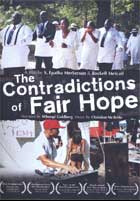
The Contradictions of Fair Hope 2013
Distributed by TDC Entertainment, 220 East 23rd St., Suite 405, New York, NY 10010
Produced by Kelly Glover
Directed by S. Epatha Merkerson and Rockell Metcalf
DVD, color, 67 min.
Jr. High - General Adult
African Americans, History
Date Entered: 05/21/2014
Reviewed by Monique Threatt, Indiana University, Herman B Wells Library, Bloomington, INWinner of numerous awards, the film documents a slice of American and African American history as told by elders of the Fair Hope Benevolent Society. Nestled in a small rural community in Uniontown, Alabama, there exist a contradiction between honoring traditional, historical and family values versus modern day commercialism and consumerism. Fair Hope, as some of the founding members still call it, is host to an annual celebration called Foot Wash. This event caters to predominately African Americans who engage in the selling and exchange of arts & crafts, clothes, drugs, food, guns, and sex thus transforming a deeply historical and religious community into a place of greed and grime.
Narrated by Academy award actress Whoopi Goldberg, historians and Fair Hope elders provide a glimpse of slavery in the south, and the devastating after effects of emancipation. With no resources to start life anew, the community of Fair Hope establish a benevolent society in 1888. Along with founding of the society, Blacks find themselves in leadership positions to implement policies which will govern its membership. The Society’s mission is to help newly freed slaves find family members, provide food and clothing, offer free burials, aid in sickness and well-being, and restore some form of pride and dignity. Adults become self-sufficient and teach themselves how to grow crops, become carpenters, embalmers, nurses and teachers. In essence, the Society exists to uplift the race, and help Blacks pull themselves up by their own bootstraps with little to no resources.
To celebrate the community’s hard work, and to bring family and friends together in fellowship, the community holds an annual event simply named The Celebration or The Society Turnout. The celebration begins with a small walk from the woods to the Society building, and includes prayer, sacred songs, good food and socializing. Those who do not wear the proper attire during the celebration are made to pay a small fine to the Society.
Little change affects Fair Hope until the great migration of the 1940s. Sons and daughters return home for the annual celebration with “new” family and friends unfamiliar with tradition. As a result of the Civil Rights Movement, African Americans are provided more opportunities for a better life. Thus, services traditionally offered by the Society now begin to diminish. Along with diminishing services also comes diminishing membership and fees. It is also during this time that some landowners start to put “money before benevolence” by leasing their property to outsiders during the celebration.
By the late 1980s, several members decide to rename The Fair Hope Benevolent Society’s annual celebration to Foot Wash to draw more attention to the area. During Foot Wash, the community is divided into “heaven” and “hell” whereas the elders hold onto their traditional ceremonies, while others engage in legal and illegal activities. The younger generation accuse the elders of being out of touch in the 21st century, and the elders accuse the younger generation of not knowing or respecting their history.
Although no final solutions are offered or settled by the film’s end, there is hope that the two generations can come together and discuss what is best for Foot Wash. The elders have extended an olive branch to the younger generation to become members of the Society. Perhaps, by being members, the younger generation will develop an appreciation for the history and legacy of Fair Hope. On a more positive note, in 2011 the Society rededicated itself to benevolence and became a reputable 501c charitable organization. It is questionable if the 501c will help the Society survive in the 21st century, but it’s a start. Until the community can find a way to work with the vendors to change the image of Foot Wash from a negative to a positive, it will continue with its activities and celebrate its 126th annual event in 2014.
The film includes archival photographs and footage, with outstanding music by Christian McBride. Interviews include founding members and descendants Ora Burks, Viola W. Chandler, Ella and Fannie Mae Coleman, Carrie Ann Harris, Bessie and Maple Hunter, John F. Owens, Mary Turner Mitchell, Margaret Threatt, Arthur, Coleman and David Turner, Willa Lee Turner, E.D. Zimmerman.
I highly recommend this film for both public and academic libraries.
Awards
- Best Documentary, Philadelphia Independent Film Festival
- Paul Robeson Award, Best Documentary, Newark Black Film Festival
- Jury Award, Best Documentary, Teaneck International Film Festival
- Dikalo Award, Best Documentary, Festival International Du Film Panafricain
- Henry Hampton Award, Roxbury International Film Festival